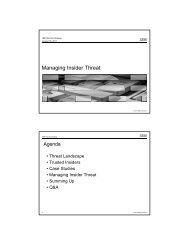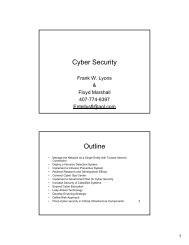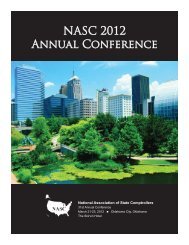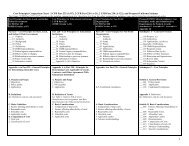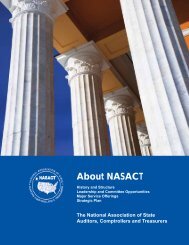Advisory Committee on Tax Exempt and Government Entities (ACT ...
Advisory Committee on Tax Exempt and Government Entities (ACT ...
Advisory Committee on Tax Exempt and Government Entities (ACT ...
Create successful ePaper yourself
Turn your PDF publications into a flip-book with our unique Google optimized e-Paper software.
The Appropriate Role Of The Internal Revenue Service With Respect To <strong>Tax</strong>-<strong>Exempt</strong> Organizati<strong>on</strong> Good Governance Issues(2) Specific Governance Practices Should Be M<strong>and</strong>ated Only In Rare AndLimited Circumstances. We do not believe specific governance st<strong>and</strong>ardsshould be a per se prerequisite to the granting of tax exempti<strong>on</strong>. There aren<strong>on</strong>profit organizati<strong>on</strong>s with model governance practices that fail to serve theircharitable purposes, comply with the requirements for exempti<strong>on</strong>, or abide bylegal obligati<strong>on</strong>s, just as there are n<strong>on</strong>profit organizati<strong>on</strong>s with minimal formal“good governance” practices that perform in an exemplary manner. While our“gut” may tell us that organizati<strong>on</strong>s that have adopted “best” practices are morelikely to be compliant, as discussed at length previously, this is not supported byempirical evidence. Further, even c<strong>on</strong>ceding the big picture propositi<strong>on</strong>, which“best” practices are really “best” also remains an open issue. To the extent thatthe IRS is reflecting a c<strong>on</strong>gressi<strong>on</strong>al finding, it is <strong>on</strong> safer ground. In enactingsecti<strong>on</strong> 4958, C<strong>on</strong>gress found that organizati<strong>on</strong>s are more likely to make betterdecisi<strong>on</strong>s about the fairness of insider compensati<strong>on</strong> <strong>and</strong> the fairness of certaintransacti<strong>on</strong>s involving insiders if those decisi<strong>on</strong>s are made by independentdirectors or committee members who rely <strong>on</strong> comparability data <strong>and</strong> whoc<strong>on</strong>temporaneously document their decisi<strong>on</strong>s. However, C<strong>on</strong>gress rewarded,but did not require, independence, use of comparability data, <strong>and</strong>c<strong>on</strong>temporaneous documentati<strong>on</strong>. Thus, it is likely that the IRS would be goingbey<strong>on</strong>d what C<strong>on</strong>gress thought was appropriate if it sought to m<strong>and</strong>ate eventhese governance practices with c<strong>on</strong>gressi<strong>on</strong>al imprimatur.We believe that no m<strong>and</strong>ated governance practice ensures compliance with therequirements for tax exempti<strong>on</strong> <strong>and</strong> that various approaches may give sufficientcomfort that an otherwise qualifying organizati<strong>on</strong> is unlikely to violate theproscripti<strong>on</strong>s against private inurement or more than incidental private benefit.M<strong>and</strong>ating such governance practices usurps the proper role of the governingbody to choose from am<strong>on</strong>g a wide variety of suitable governance practicespermitted under state law based <strong>on</strong> the distinctive aspects of the organizati<strong>on</strong><strong>and</strong> also has the greatest potential for harm to the diverse, vibrant, <strong>and</strong> flexiblecharitable sector, particularly when there is little or no empirical supportsupporting specific n<strong>on</strong>profit governance practices. Moreover, should the IRSseek to implement specific governance st<strong>and</strong>ards as a c<strong>on</strong>diti<strong>on</strong> for exempti<strong>on</strong>,we urge it do so through the regulatory process, thereby ensuring an opportunityfor public comment.As discussed previously, 143 there are <strong>on</strong>ly a limited number of situati<strong>on</strong>s wherethe IRS has issued precedential or n<strong>on</strong>-precedential guidance to the effect that itis m<strong>and</strong>ating specific governance practices as a c<strong>on</strong>diti<strong>on</strong> for exempti<strong>on</strong>. Weappreciate the reas<strong>on</strong>s that the IRS has sought to create governance litmus testsin complicated areas such as health care, <strong>and</strong> we agree, for example, that anindependent governing body can be viewed as a favorable factor indeterminati<strong>on</strong>s, but we encourage the IRS to utilize more flexible st<strong>and</strong>ards thatallow for c<strong>on</strong>siderati<strong>on</strong> of all the facts <strong>and</strong> circumstances in determining whether143See supra notes 107-09 <strong>and</strong> accompanying text.ADVISORY COMMITTEE ON TAX EXEMPT AND GOVERNMENT ENTITIES (<strong>ACT</strong>) June 11, 2008 48






